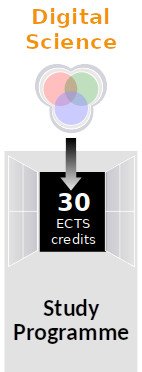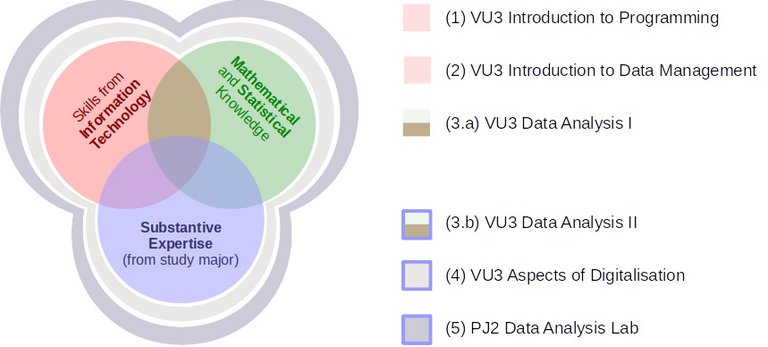Minor Digital Science
In the age of digitalization when almost all aspects of our lives depend on computers and more and more decisions are based on data, it is crucial to understand the foundations of digitalization. Computer and data literacy is required for many well-paid jobs across a broad range of domains and markets. Digitalization skills impact daily work with
-
improved efficiency and productivity by automating routine tasks,
-
better decision making based on knowledge gained from data,
-
higher potential for innovation thanks to an interdisciplinary perspective.
These skills can be acquired in the Minor Digital Science (Wahlpaket Digital Science), which is offered to bachelor's and master's students from a wide range of backgrounds.
Duration
3 semesters (recommended)
30 ECTS credits
Degree
Annotation on the notice ("Bescheid") or confirmation document
Prerequisites
None
No enrollment required
The Minor Digital Science is designed to augment the students’ skill set and open the door to new career opportunities in the age of digitalization. It provides a solid foundation in digitalization relevant to students’ disciplines. It conveys the generic skills required for automated data analysis and offers a selection of courses on specific technologies, methods, and aspects related to students’ majors. Finally, it offers the opportunity to conduct a complete data-based decision-making process under the individual supervision of our teachers. To assure high effectiveness of learning, interdisciplinary groups are kept small and vary from 20 to 40 students.
Expected learning outcome: Upon successful completion of the Minor Digital Science, students are capable of applying fundamental methods in the field of digital science. They understand methods and techniques from the fields of programming, data management, and data analysis. They are aware of the broad context of digitalization. They are able to apply techniques of digital science to their field.
The Minor Digital Science can be taken within bachelor's and master's programs without any restrictions as to students’ backgrounds or prior experience. It offers flexibility in content and structure to meet the needs of diverse academic programs. Moreover, the courses are offered mostly at off-peak hours.
There are two options to take courses:
- as the complete package of 30 ECTS credits if a major allows for a minor to be incorporated into the curriculum,
- as individual courses (5 ECTS credits each) within the module Non-disciplinary/Interdisciplinary Skills and the module Individual Choice of Specialization.
It is possible to initially take individual courses and have them accredited later if and when a student's major allows for the incorporation of minors. Deans of studies may provide information about future integration plans.

The Minor Digital Science combines information technology skills and mathematical and statistical knowledge all embedded in the substantive expertise from students’ majors.
- Information technology skills are required to manage data, to automate processes, and to make them replicable.
- Mathematical and statistical knowledge is necessary to understand and meaningfully apply statistical models and machine learning methods.
- The substantive expertise is needed to be able to find sources of data and meaningfully interpret results obtained from the analysis of data.
The package consists of five modules with, in total, six courses of 5 ECTS credits each. Half of the courses focus on generic skills (1-3.a) and the other half on domain-specific skills and applications (3.b-5).

See OLAT for FAQ
In case of questions, please contact Joanna Chimiak-Opoka.
References
- The Minor Digital Science is one of the minors offered by our university (just for quick access; the formal description was announced in the university bulletin [Mitteilungsblatt] on July 3, 2019, Issue 71, No. 624 and last updated on July 2, 2021, Issue 93, No. 903. The legally binding version is in German, but there is also a courtesy translation in English).
- The list of the current and upcoming courses given by the DiSC teachers can be found in the course catalog, our books can be accessed via DiSCDown.
- For study-related issues, please subscribe to DiSC@OLAT, which was created as an information exchange platform for students interested in courses related to digitalization. There, we provide a list of currently open and planned courses, suggested studying order, news, a discussion forum, and more.
- A comprehensive article (in German) about the launch of the Minor Digital Science was published in January 2020. Additionally, check the News section for more articles about teaching.
- Check out our testimonials page to learn what other students say about our minor.
